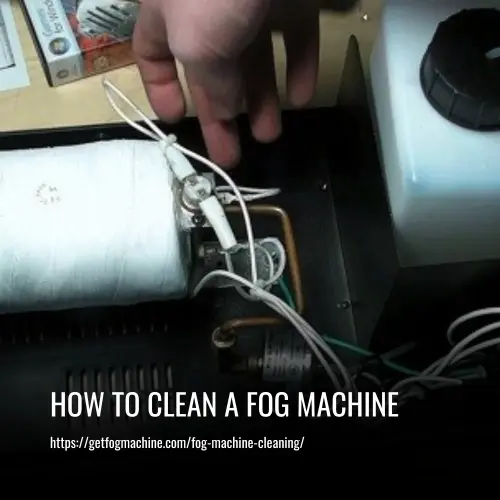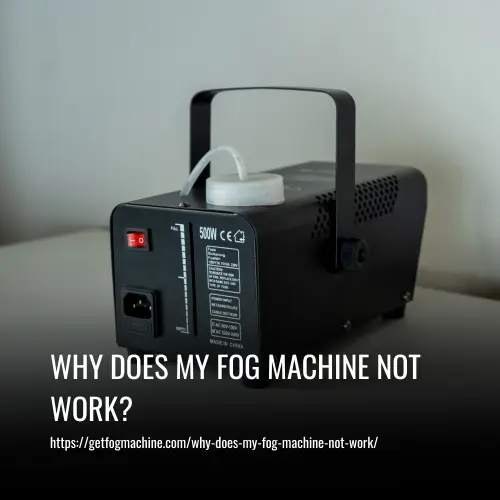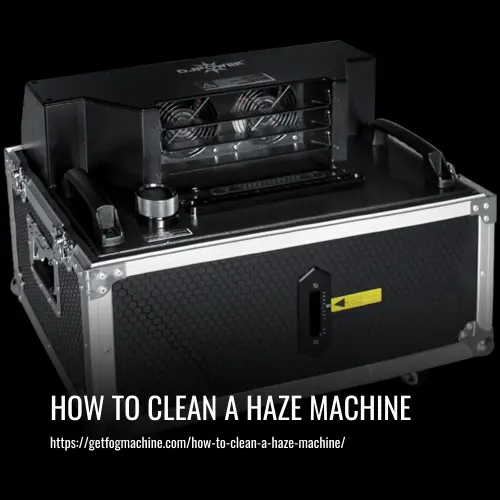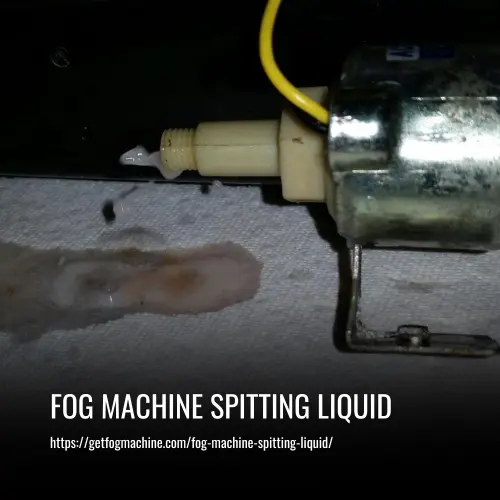Why is My Fog Machine Leaking? Common Causes and Solutions
This post contains affiliate links. As an Amazon Associate, we earn from qualifying purchases.
Your fog machine may be leaking for several reasons. One common cause is the poor fit and finish of the fog machine itself, which can result in leak spots appearing quickly after initial use. Additionally, fog-filled bubbles tend to settle on the machine, creating moisture that can lead to leaks on and around the machine’s surface.
It is important to ensure that all components, such as the fluid tank and valves, are properly sealed and functioning. Regular maintenance, including checking for any blockages or faulty parts, can help prevent leaks in your fog machine.

Understanding the Common Leak Locations On a Fog Machine
Common leak locations on a fog machine include the fog juice reservoir, the indication glass on the fogger, and the container that produces air bubbles.
1. The Fog Juice Reservoir Leak
To fix a leak in the fog juice reservoir, lift the metal backing and correct any issues with the fill hole or the plastic fog juice container. If there are any cracks or leaks in the container, they can be covered with caulk or a permanent waterproof construction sealant. Hot glue may work for small holes, but it may not adhere well to moist plastic in the long term.
2. An Air Bubble Generating Container Leak
To prevent leakage from the air bubble container, add a zip tie at the end of the tubing that connects to the fog juice bottle. If the connecting tube has entirely split from the air bubble container, it will cause a gradual leak. Using liquid nails epoxy or a strong epoxy can temporarily fix this issue, as well as applying caulk or another watertight barrier. However, it is important to use strong epoxy to prevent the leak from reoccurring during reassembly.
3. Leak from the Opening in the Container That Produces Air Bubbles
To prevent leaks from the hole in the air bubble container, avoid filling the fogger all the way to the maximum capacity line, as surplus fog juice can leak out. Only fill the fogger after it is in its permanent seasonal placement and make sure to empty it at the end of the season. It is impossible to prevent leaking from the air bubble container entirely due to its design.
4. Damaged Bubble Arm
If the bubble arm is not functioning correctly, such as not dipping into the bubble fluid or making a loud noise, there may be an issue with the gears. Manual movement without resistance indicates broken gear. Finding replacement equipment may be difficult.
Causes of Fog Machine Leaking
Fog machines can provide an exciting and atmospheric element to any event or performance. However, it can be frustrating when your fog machine starts to leak. There are several common causes of fog machine leaking that can disrupt your fog effects.
1. Clogged Nozzle
A common cause of fog machine leaks is a clogged nozzle. When the nozzle becomes blocked, the fluid can build up and eventually leak from the machine. To resolve this issue, you can clean the nozzle using a small wire or needle to remove any debris or buildup.
2. Damaged Pump
A damaged pump can also lead to fog machine leaks. If the pump is not functioning properly, it may not be able to effectively distribute the fog fluid, causing it to leak. In this case, the pump will need to be replaced to fix the issue.
3. Faulty Valve
A faulty valve can be another culprit for fog machine leaks. When the valve is not closing correctly, it allows the fluid to escape from the machine. To address this problem, the faulty valve should be replaced with a new one.
4. Overfilled Fluid Tank
Overfilling the fluid tank can result in leaks. When the tank is filled beyond its capacity, the excess fluid has nowhere to go, causing it to leak from the machine. To prevent this issue, make sure to drain any excess fluid from the tank before running the fog machine.
5. Loose Connections
Loose connections can also cause leaks in fog machines. If the connections between the different parts of the machine are not properly tightened, the fluid can escape through these gaps. To fix this issue, check and tighten all connections to ensure a secure fit.
6. Cracked Fluid Lines
Cracked fluid lines can lead to leaking issues in fog machines. When the lines are damaged, they are unable to contain the fluid, causing it to leak. To resolve this problem, the cracked lines should be replaced.
7. Worn Seals and Gaskets
Worn seals and gaskets can also contribute to fog machine leaks. Over time, these components can deteriorate, allowing the fluid to escape. To fix this issue, it is necessary to replace the worn seals and gaskets.
8. Improper Storage and Extreme Temperatures
Improper storage and exposure to extreme temperatures can also cause fog machine leaks. Storing the machine in a cool and dry place can help prevent leaks caused by temperature fluctuations.
9. Low-Quality Fluids
Lastly, using low-quality fluids in fog machines can result in clogs and leaks. These fluids may contain impurities that can block the machine’s components and lead to leaking issues. To prevent this problem, it is advisable to use high-quality fluids recommended by the manufacturer.
By addressing these various causes of fog machine leaking, you can ensure optimal performance and avoid unnecessary fluid leaks.
How to Fix a Leaking Fog Machine
Fog machines can provide an enchanting atmosphere at parties or events. However, if your fog machine is leaking, it can be a frustrating issue to deal with. Here are some steps to fix a leaking fog machine:
1. Identify the cause of the leak
There are several common causes of fog machine leaks, such as air leaks, faulty valves, or a faulty fluid tank. Check for visible signs like fluid pooling or dripping to determine the source of the leak.
2. Follow the appropriate solution
Once you have identified the cause, apply the appropriate solution. For example, if the leak is due to an air leak, check for loose connections and tighten them as necessary. If the issue lies with a faulty valve, consider replacing the valve.
3. Test the machine
After making the necessary repairs, it’s important to test the machine to ensure that the leak has been resolved. Fill the fog machine with a small amount of fog juice or fluid, and run it for a short period of time. Monitor for any signs of leakage during operation.
By following these steps, you can address the issue of a leaking fog machine and enjoy a seamless, hassle-free fog production experience at your next event.
Preventing Fog Machine Leaks
To ensure that your fog machine operates smoothly without any leaks, it’s important to take preventive measures. Follow these simple steps to prevent fog machine leaks:
1. Use high-quality fluids
Only use fluids that are recommended by the manufacturer for your fog machine. Low-quality fluids may contain impurities that can cause clogs or damage to the machine, leading to leaks.
2. Proper storage
Store your fog machine in a cool and dry place. Extreme temperatures can cause the materials in the machine to expand or contract, potentially leading to cracks or leaks. Additionally, moisture can cause corrosion in the machine’s components.
3. Maintain a moderate temperature environment
Avoid exposing your fog machine to extremely cold or hot temperatures. Manufacturers typically provide recommendations for the appropriate temperature range for operating the machine. Operating the machine within this specified temperature range helps prevent leaks.
4. Regular maintenance
Perform regular maintenance on your fog machine to prevent leaks. This includes cleaning the nozzle regularly to prevent clogs and replacing worn seals and gaskets to ensure proper sealing of the machine’s components.
By following these preventative measures, you can keep your fog machine in optimal condition and minimize the risk of leaks. Regular maintenance and proper storage go a long way in ensuring the longevity and performance of your fog machine.
FAQs
Fog machine leaks can occur due to various factors. Some common causes include clogged nozzles, damaged pumps, and faulty valves. Over time, residue from fog juice can build up in the machine, leading to clogs that can cause leaks. Additionally, wear and tear on the machine’s components can also contribute to leaks.
There are several signs that can indicate a leaking fog machine. These include fluid pooling under the machine, a decrease in fog output, and a foul odor. If you notice any of these signs, it is important to address the issue promptly to prevent further damage to your machine.
No, it is essential to use high-quality fluids that are recommended by the manufacturer for your specific fog machine. Using the wrong type of fluid can lead to clogs and leaks, and it may also void any warranty on your machine. Be sure to follow the manufacturer’s guidelines when selecting and using fog fluid.
Regular cleaning and maintenance are crucial to keep your fog machine in optimal condition and prevent leaks. It is recommended to clean the nozzle and perform routine maintenance after every use. This will help remove any accumulated residue and ensure the smooth operation of your machine.
If you have experience and knowledge in repairing fog machines, it may be safe to attempt repairs yourself. However, if you are not familiar with the inner workings of the machine, it is best to seek professional assistance. Mistakes or improper repairs can further damage the machine or pose safety risks.
Conclusion
If you find your fog machine leaking, don’t panic! It’s a common issue that can easily be resolved. By following the troubleshooting steps mentioned in this article, you’ll be back to creating a spooky atmosphere in no time.
Remember, a little maintenance and care goes a long way in ensuring your fog machine works smoothly. So, fix that leak and let the fog roll in! Happy haunting!






